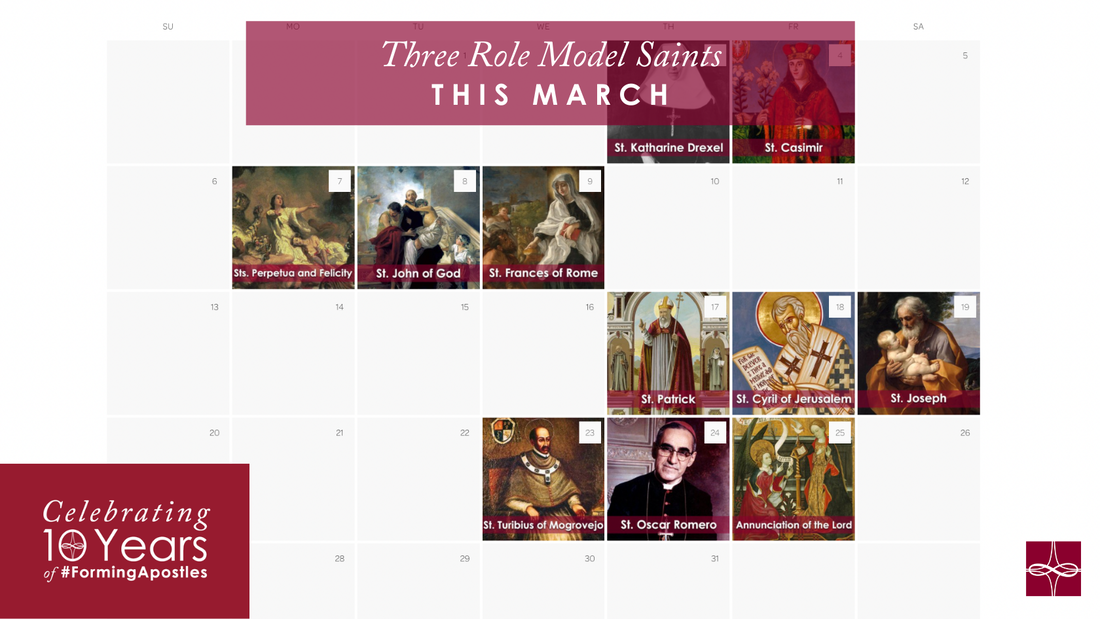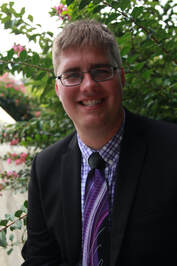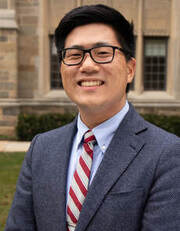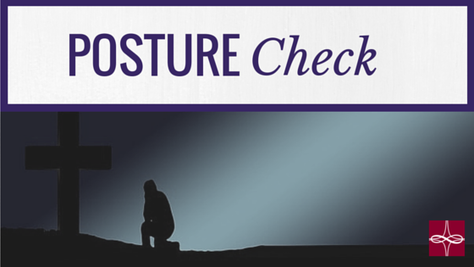|
On the Center’s Feast Day Website, March is the month with the least number of feast days, 11 in total. But, this doesn’t mean that there isn’t a range of saints and life experiences represented this month. Two of the saints in March are perhaps some of the most well-known saints: St. Patrick and St. Joseph. Also this month, we will celebrate a famous American saint, St. Katharine Drexel, an influential Peruvian, St. Turibius of Mogrovejo, and one of my favorite saints, the Salvadoran St. Oscar Romero. St. Katharine Drexel St. Katharine Drexel was born in 1858 in Philadelphia. She was born into a wealthy family and inherited a large sum of money after her father died. Katharine and her sisters wanted to help Native Americans and African Americans with the money they inherited. In a private meeting with the pope, he recommended that Katharine become a sister to carry out the work she wanted to do. Doing this, however, would require Katharine to leave the affluent social circles of Philadelphia. She decided that she was being called to religious life and founded the Sisters of the Blessed Sacrament. To this day, the Sisters founded by Katharine continue to work for the education of Native Americans and African Americans across the United States. I find St. Katharine Drexel’s life particularly admirable because of the courage it must have taken to step into the unknown of founding a religious community even though she had such security in the wealth of her inheritance. St. Turibius of Mogrovejo The feast of St. Turibius of Mogrovejo is celebrated on the day of his death, March 23rd. He became archbishop of Lima, Peru in 1580, moving from his native Spain to Peru to be the archbishop. While he was archbishop, he focused on evangelization throughout his diocese. This included many, many baptisms, including baptizing eventual saints Rose of Lima and Martin de Porres. Turibius also focused on incorporating the indigenous languages into the work of the priests throughout the diocese. Personally, I think St. Turibius’ wisdom and understanding carries many lessons for us today. His ability to go into an unknown place and work with the local community can be a model for our efforts in the New Evangelization. Let us not forget the local community and culture of where we might minister, but collaborate with the culture and community. St. Oscar Romero One of my favorite saints is St. Oscar Romero. I did not know much about the life of St. Oscar Romero until I visited El Salvador in 2019. While I was in El Salvador, I got to visit his tomb as well as the chapel where he was celebrating Mass when he was killed. Romero was named the archbishop of San Salvador in 1977 because he was considered a safe, non-divisive choice in the country that had extreme political unrest. However, Romero saw the extreme suffering of the people of El Salvador and devoted himself as archbishop to speak out against the injustices faced by Salvadorans. He knew that doing this put his own life in extreme danger, but he was willing to do so to help Salvadorans. In 1980, after only 3 years as archbishop, Romero was shot and killed while celebrating Mass. Today, Romero is one of the most well-known and respected Salvadorans. Whether you know a lot or nothing at all about St. Oscar Romero, I encourage you to read more about his life, especially the homilies and speeches he gave to all of the people of El Salvador. This March, let us learn more about the lives of St. Katharine Drexel, St. Turibius of Mogrovejo, and St. Oscar Romero and ask for their intercession in our lives and in the life of the Church. To learn more about the saints, visit our Catholic Feast Days Website by clicking here. To view a calendar of the feast days in March, and each month, click here.
0 Comments
"What about you? What are you going to do?" These are the words of Pope Leo XIII to St. Katharine Drexel, whose feast day we celebrate today, when she spoke to him of the needs of the missions in Wyoming. The Holy Father’s response stopped Sister Katharine in her tracks, but it also made her reconsider how she approached her life of faith. Sister Katharine returned to the United States and went on to found over fifty missions for Native Americans, a system of schools for Black Catholics, and various other mission centers and schools. Every day, Christ poses to us a question similar to the one Pope Leo XIII posed to St. Katharine Drexel: “What about you? What are you going to do?” Pope Francis spoke of this encounter when he visited Philadelphia for the World Meeting of Families in 2015. He commented on the fact that St. Katharine was herself young and full of fervor for the Lord and wondered rhetorically how many young people around us have a similar energy and fervor. He asked in his homily at Sts. Peter & Paul Cathedral in Philadelphia “Do we challenge them? Do we make space for them and help them to do their part? To find ways of sharing their enthusiasm and gifts with our communities, above all in works of mercy and concern for others? Do we share our own joy and enthusiasm in serving the Lord?” The Holy Father touched on the call of all of the baptized to be missionary disciples. This call requires us to be open to all that the Holy Spirit may be guiding us to while still carrying forth the legacy of the past. The third major point that the Holy Father addressed was the role of the laity. He said, “We know that the future of the Church in a rapidly changing society will call, and even now calls, for a much more active engagement on the part of the laity.” The Holy Father’s point is that to properly answer the question, “What are you going to do?,” there must be collaboration by and co-responsibility of the lay faithful who work together with the ordained to make manifest the redemptive and salvific nature of the Church of Jesus Christ. The Holy Father then reminds us that this collaboration and co-responsibility is not a game of power and position. He says, “This does not mean relinquishing the spiritual authority with which we have been entrusted; rather, it means discerning and employing wisely the manifold gifts which the Spirit pours out upon the Church.” Each of us have been given different gifts and charisms that build up the Kingdom of God; the Holy Father challenges us to use them. The questions that Pope Leo XIII asked St. Katharine Drexel are the questions of vocation. In both our universal call to holiness that we receive from our baptism and in our particular vocation, we are faced with these questions: “What about you? What are you going to do?” We are not necessarily called to build up schools and mission centers as did St. Katharine, but to answer these questions we must be willing to be open to where the Spirit is guiding us, to see how our gifts and talents can be best utilized for the Kingdom and to answer our call to be “leaven of the Gospel in our world.” For more resources on missionary discipleship, please click here. For more resources on collaboration and co-responsibility, please click here. How is your posture? Whether I’m teaching a relaxation and scripture meditation class, aerobics, floor and core work, strength and balance, or working one-on-one with an individual, I am constantly reminding my students to, “check in with your posture.” Are your feet firmly planted in the ground? Are you engaging your thighs? Is your pelvis tilted under and your spine lengthened? Is your core engaged? Are your shoulders rolled down and back? Is your head and neck lifted? Where is your focus? I’m sure that any of my students will tell you that, at first, it is slightly unnerving to hear constantly. Soon, however, we each come to realize what an important role proper posture plays, not only in our everyday lives, but especially during our exercises. The simplest of movements can be made more challenging and more beneficial for the whole body and mind by engaging and practicing proper posture. Through the effort of involving the whole body, we are able to improve our balance, kinesthetic awareness, and better focus on isolating the specific muscles that we are moving or working. When we are able to unite that kind of movement awareness with the sacrifice of an intention or prayer, powerful things can happen within and through us. Although it is hard to believe, we are just about half way through our Lenten journey. It’s time to check in with our spiritual posture. Are we engaging our Lenten spiritual muscles of prayer, fasting, and almsgiving? Is our human pride tucked under and our humility engaged? Are our shoulders rolled back and our head held high during our offerings of sacrifice so as not to draw attention to our sacrificial efforts? (Matthew 6:5-8) Or are we simply going through the motions, executing the exercise, without engaging our whole selves? We are all called to be saints within our own right. Becoming a saint and bringing the glory of God and the saving power of Christ into the world is what we were created to do. That is our Eastertide. That is what we are “training” for. Lent is not meant to be business as usual. Therefore, our spiritual posture becomes even more relevant and important as we challenge, exercise, and train ourselves for what we are called to be. There may be times in our lives where going through the motions is necessary. Sometimes, it may be all we can do—and that’s okay. However, Lent is our time to persevere. Lent is our training season. What do we need to remove from our lives to reach a healthier state spiritually, emotionally, mentally, and physically? What are the things we need to hang onto or strengthen in order to reach our Easter goal? As we assess our journey thus far, perhaps we can call upon the assistance and intercession of St. Katherine Drexel as we honor her on her Feast Day today. Saint Katherine Drexel beautifully expresses that our entire being and all that we do, from work to play, to keeping ourselves healthy, should be offered back to our heavenly Father for His glory. For it is only through Him that we receive our spirit and our faculties. It is through Him and our offerings to Him that we receive the strength and ability to complete the work that He calls us to and to become the saints we are called to be. In her personal writings, she prayed: “Yes, my Lord and my God Jesus, to you I commend my spirit, my soul with its faculties, my body with its senses, my heart with its affections, all that I have, and all that I am. Dispose of me absolutely, in everything, according to your will. From now on, dearest Jesus, may everything outside you be a matter of indifference to me, provided only I accomplish your will and advance in your love. O Jesus, I love you and your Mother and abandon myself to your love for time and eternity.” Check in with your posture. Do the hard work and don’t be afraid to sweat your way through the rest of Lent. Unite your work, your dedication, and your sacrifices with the saints and angels and call on their intersession for strength. Stay focused on the end result, the finish line, the Easter joy. For more resources to help your spiritual Lenten posture, click here. After the Holy Father’s first visit to the United States, the Catholic Apostolate Center would like to share some of our favorite quotes from his time here. This is a two-week series where we will share 10 quotes each week. We invite you to use these quotes and images as you “Move forward! Siempre adelante!” in your journey of faith.
1. "Love is shown by little things, by attention to small daily signs which make us feel at home. Faith grows when it is lived and shaped by love." (Homily, Mass on Benjamin Franklin Parkway) St. Therese of Lisieux championed the “little way” of attaining holiness by doing small things with great love. Today, Pope Francis reminds us that it is in doing little things with great love that we can achieve sanctity. Try this week to incorporate the “little way” mentality into your work, your home, your parish or your school. 2. "I encourage you to be renewed in the joy of that first encounter with Jesus and to draw from that joy renewed fidelity and strength." (Homily, Mass with Bishops, Clergy and Religious, Cathedral of Sts Peter and Paul) It is the personal encounter with Jesus Christ that is at the heart of our journey to holiness. All of us are invited to have the “for me” moment of Mary after the Annunciation, who proclaimed to her cousin Elizabeth, the “Almighty has done great things for me” (Lk 1:49). This “for me” statement is the result of God’s work in our personal lives—it is the distinct relationship that each person has with God himself. Spend some time reflecting upon your personal encounter with Christ. When did it happen in your life? What great things has the Lord done for you? If you feel like you haven’t yet encountered Christ personally, ask him to open the eyes of your heart so that you may know how much you are loved. 3. “What about you? What are you going to do?” (Homily, Mass with Bishops, Clergy and Religious, Cathedral of Sts Peter and Paul) In his homily during Mass at the Cathedral of Sts. Peter and Paul, Pope Francis talked about the story of St. Katharine Drexel when she spoke to Pope Leo XIII about the needs of the missions. After listening to her, Leo XIII wisely asked her, “what about you? what are you going to do?” Rather than pointing out the needs of your community, parish or school to others, why not try to fill the void or start a positive change yourself? What if we contributed constructive ideas and did some of the hard work instead of pointing out weaknesses or problems in our institutions? Many in our world today misunderstand Catholicism and the Church. Pope Francis asks us the same question today, “what about you? What are you going to do?” 4. "We are sought by God; he waits for us." (Homily, Mass on Benjamin Franklin Parkway) Sometimes, we may feel lost or abandoned. Friends, family members or co-workers may let us down. Our lives may seem plagued by suffering, loss or confusion. In whatever situation you may find yourself in today, you are sought by God. You are loved. You are pursued. You are waited for. God, who is greater than time, is completely present to you and your life. He awaits only for your invitation. You are sought by God. Today, we invite you to seek him in return. 5. "Jesus seeks us out." (Visit to detainees at Curran-Fromhold Correctional Facility) Jesus seeks us out personally. We see this in a very real way in the account of Jesus and the Samaritan woman. Jesus goes to the well and waits for the woman there. She goes in the middle of the day, the hottest time, in order to avoid other people in her community because she is living a life of sin. At first, the woman is defensive and even rude to Christ, but by the end of their dialogue, she proclaims that he is the Messiah and goes off to tell the whole town. Jesus is not scandalized by our sin in the sense that he will never abandon us to it or fail to seek us out in the midst of it. Christ seeks you out today at whatever well you find yourself standing by. 6. "May you make possible new opportunities; may you blaze new trails, new paths." (Visit to detainees at Curran-Fromhold Correctional Facility) We are given our mission at Baptism. This mission leads us down news trails and new paths that are meant to bring us back to God and bring others along with us towards him. All of our lives have a divine purpose. We can change and sanctify the world from wherever we find ourselves. These words from Pope Francis are made more powerful given their context: he is speaking to detainees in prison. What Pope Francis is reminding them of is the importance and dignity of their lives. Regardless of the fact that they are behind bars, they can still blaze new trails and new paths. They can still pursue holiness and make new opportunities. They can still sanctify the world by their actions. Pope Francis says these words also to me and you. 7. "Do not be discouraged by whatever hardships you face." (Address for the Meeting for Religious Liberty at Independence Hall) We are a people of Resurrection, a people called to join in the victory of Christ. If you’re going through hardship, you’re not alone. Everyone is impacted by sin, suffering and death—but Christ has given us the hope of eternal life and joy. After his Passion, when the Resurrected Christ appeared to his disciples, he told them, “Peace I leave you, my peace I give you” (Jn 14:27). He promises peace that the world itself cannot give. If you’re feeling discouraged, ask Christ today for his peace. It is the peace that surpasses all understanding, but it is peace that remains despite sin, suffering and death. 8. "Let us preserve freedom. Let us cherish freedom." (Address for the Meeting for Religious Liberty at Independence Hall) Freedom entails serving the common good. What frees us completely is self-sacrificial love. For this reason, Jesus was completely free, as was his mother Mary. They were unencumbered by selfishness, living instead for others. Our nation was built on the principles of life, liberty and the pursuit of happiness. Pope Francis reminded the United States of this foundation in his address at Independence Hall, calling us to preserve and cherish freedom. We do this day by day when we imitate Jesus and Mary by living for others. 9. "Go out, again and again, go out without fear, go out without hesitation. Go out and proclaim this joy which is for all the people." (Mass at Madison Square Garden) We are called to be witnesses of the joy of the Gospel daily. One act of love or service is not enough. We can often get complacent with our good deeds and actions—a temptation the Pharisees fell into. Instead, we are called each day to ask, “what more can I do for Christ? How can I continue to grow? Are there people that need my love, respect or attention?” Pope Francis’ words revitalize us. Go out again and again in hope, with joy and with courage to proclaim the of Christ. 10. "Go out to others and share the good news that God, our Father, walks at our side." (Mass at Madison Square Garden ) Part of the good news is that God walks at our side. We are never alone in proclaiming the Gospel or in pursuing holiness. God is with us—giving us everything we need through other people, prayer, his grace, the sacraments. When we fall, he picks us back up. When we are weak, he carries us. We live in the joy of knowing we can do all things through Christ who strengthens us (cf Philippians 4:13). This joy impels us to proclaim this good new to others. For more resources from Pope Francis' Papal Visit to the United States, please visit http://www.papalvisit2015.us. |
Details
Archives
July 2024
Categories
All
|
About |
Media |
© COPYRIGHT 2024 | ALL RIGHTS RESERVED








 RSS Feed
RSS Feed